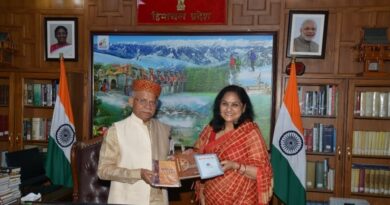A Silent Surge : Himachal Battles Rising Cancer Cases Amid Alarming Trends
Cancer is quietly tightening its grip on Himachal Pradesh, with the number of patients steadily climbing year after year. During the monsoon session of the state assembly, Chief Minister Sukhvinder Singh Sukhu revealed a startling fact: Himachal now ranks second in cancer cases per capita, just behind the northeastern states. The revelation has sent shockwaves through the health department.
Dr. Siddharth Vats, a cancer specialist at IGMC Shimla, shared that over 2,000 new cases are reported annually, and the numbers have nearly doubled in the last decade. While recent years have shown a slight dip — 2,428 cases in 2022, 2,363 in 2023, and 1,836 in 2024 — the figures remain deeply concerning given the state’s population.
Districts Under Pressure
From Bilaspur to Shimla, every district is feeling the strain. Mandi and Shimla reported the highest numbers, with hundreds of cases each year. Even remote regions like Lahaul-Spiti are not untouched. The data paints a picture of a state-wide health challenge that demands immediate attention.
Inside IGMC: A Glimpse into the Crisis
In 2024 alone, IGMC Shimla treated:
- 215 cervical cancer cases
- 157 breast cancer cases
- 367 lung cancer cases
- 98 stomach cancer cases
- 180 head and neck cancer cases
These numbers reflect a troubling reality: cancer is no longer rare, and its reach is expanding.
Gender Divide and Unique Patterns
Dr. Vats notes a clear pattern — breast and cervical cancers are rising among women, while men are more affected by lung and stomach cancers. Himachal, in particular, sees a higher incidence of stomach cancer compared to other states, prompting calls for deeper research.
Lifestyle, Pollution, and Pesticides: The Hidden Culprits
Experts point to lifestyle changes, tobacco use, poor diet, environmental pollution, and heavy pesticide use in agriculture as major contributors. With most residents engaged in farming, the chemicals used in fields are directly impacting food safety and public health. Dr. Vats urges the government to set scientific standards to regulate pesticide use.
Prevention is Power
Dr. Vats emphasizes that prevention is the strongest weapon against cancer. He advises using steel or glass utensils instead of plastic, avoiding tobacco, eating balanced meals, exercising regularly, and getting timely health check-ups. Early detection can make all the difference.
Reaching the Roots: Camps and Awareness
To combat the crisis, Dr. Vats recommends organizing cancer screening camps in villages and launching awareness drives in schools and colleges. Catching the disease early can save lives, and spreading awareness is key to protecting future generations.



